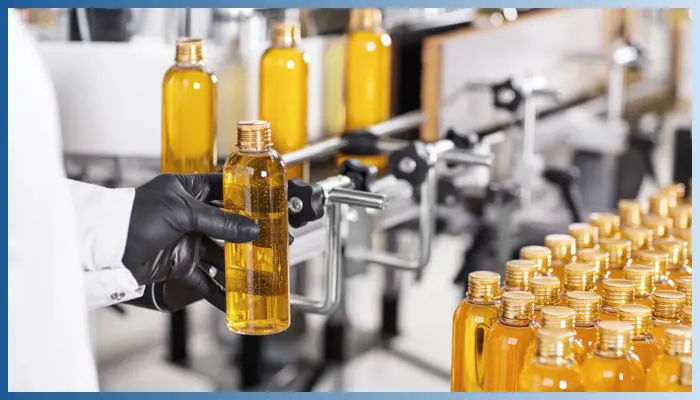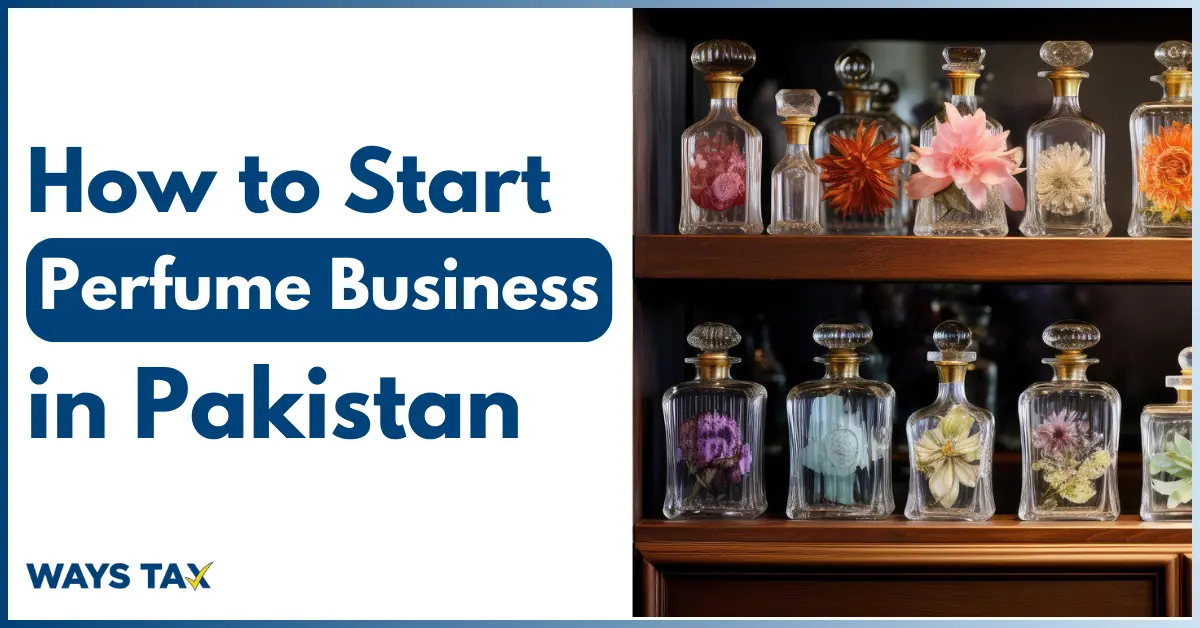How to Start a Perfume Business in Pakistan: A Complete Guide
So, you want to start your own perfume line? Great. But let me ask you this: Do you know how to start a perfume business in Pakistan? How to avoid the costly mistakes that can sink your brand before it even takes off?
Creating a fragrance line is not just about having a good idea. It is about knowing exactly how to make that idea work. We have connected with thousands of perfume businesses of every size (as we help them in the registration of their business), therefore we have seen what works (and what does not.
That’s why we put together this no-fluff guide. Inside, you will discover how to find trustworthy suppliers, pick the perfect ingredients, and what challenges you may face in starting this business.
Ready to make it happen? Let’s go.
Register Your Perfume Business with Waystax
We handle the paperwork so you can focus on crafting and selling perfumes.

Why Start a Cosmetics Business?
The perfume market in Pakistan is one of the emerging industries due to social and cultural changes, scenic desires, rising consumer concerns, and an ever-changing lifestyle.
In the past, the part played by fragrances has been very vital in the population of Pakistan as traditional attars and alcohol-free perfumes have always been in fashion.
Over the past few years, the market has grown and competes between international and local brands depending on taste.
Key Highlights of the Industry

Market Growth
The fragrance market in Pakistan will reach $0.89 billion in 2024, growing at an annual rate of 2.36%.

Consumer Preferences
Older generations favor traditional attars for prayers, while younger consumers are shifting to Eau de perfumes and body sprays. Alcohol-free perfumes are popular due to religious preferences.

Local & International Players
Dominant local brands like Scent N Stories, Junaid Jamshed, and Saeed Ghani offer halal fragrances. Luxury international brands are gaining traction.

E-Commerce Impact
Online shopping platforms like Daraz and social media are boosting product awareness, with celebrity endorsements playing a key role in market growth.
How to Start a Perfume Business in Pakistan?
Following are the 14 steps you should take to start a successful perfume business in Pakistan
Step 1. Conduct Market Research
Give an insight into the nature of the perfume industry in Pakistan. Understand how the market is operating, who the competitors are, and what the customers are looking for. Find underserved areas and allow you to create new products or provide new services.
Step 2. Define Your Niche
Choose the niche of the perfumes that you wish to offer to your customers; whether it is the glamorous, economically priced, essential oil or the specialty perfumes. Use elements such as scent type and packaging to appeal to your audience.
Step 3. Create a Business Plan
Provide a clear vision of the goals for your business, describing its intended target market, proposed marketing mix, and your revenue forecasts.
Perfume Business Plan for Pakistan
Initial Goals
Three-Month Goals
Six-Month Goals
12-Month Goals
Financial Forecasts
| Category | Amount (PKR) |
| Startup Costs | |
| Product Development | 200,000 |
| Marketing & Branding | 100,000 |
| Packaging & Bottles | 150,000 |
| Website Development | 50,000 |
| Initial Inventory | 100,000 |
| Miscellaneous | 50,000 |
| Total Startup Cost | 650,000 |
| Monthly Expenses | |
| Rent/Utilities | 20,000 |
| Manufacturing Costs | 50,000 |
| Marketing & Ads | 30,000 |
| Retailer Commissions | 20,000 |
| Miscellaneous | 10,000 |
| Total Monthly Expenses | 130,000 |
| Revenue Projections | |
| First Month Revenue | 50,000 |
| By Six Months | 300,000/month |
| By Twelve Months | 500,000/month |
Step 4. Register Your Business
Get licenses and registrations in similarly applicable government agencies like the Federal Board of Revenue (FBR) for tax efficiency, or the health or business regulating authorities.
Let us handle it for you! Contact Ways Tax today, and we’ll take care of your licensing and registration needs.
Do You Need a License to Make Perfume in Pakistan?
Yes, it is essential to acquire a license to start a perfume business in Pakistan.
This involves the following processes; First, you have to register the business with the SECP, second, you have to obtain a TIN number for your business from the FBR and third, you might need the clearance of authorities from health departments such as DRAP.
You also have to meet the environmental standards concerning chemical waste disposal.
Let Waystax handle your licensing and registration needs—contact us today!
Legal Requirements for Perfume Manufacturing
To legally manufacture perfume in Pakistan, you must meet several regulatory requirements:
- Register Your Brand: Keep your brand and trademark well protected and registered with the Intellectual Property Organization (IPO).
- Comply with the General Cosmetics Act 2023: LPAO or the Local Producing and Advertising of Cosmetic Products Act deals with cosmetic products such as quality, labeling, packaging, manufacture, storage, sale, and distribution of perfumes.
It also deals with matters to do with imitation cosmetic products. - Follow Good Manufacturing Practices (GMP): In your manufacturing process, you must be in a position to meet good manufacturing practices in order to produce high-quality and safe products.
- Report Adverse Events: You are legally required to inform your target public in the unlikely event of any mishap concerning your products.
- Label Fragrance Allergens: Make sure the fragrance allergens are well labeled in your products.
- Maintain Hygienic Conditions: Your manufacturing facility has to meet high levels of hygiene because consumers’ needed products must be safe for their consumption.
- Regulatory Oversight: These are supervised by the Pakistan General Cosmetics Regulatory Authority, and they regulate policies of cosmetic development, import, and export.
The General Cosmetics Act 2023 also provides for stiff measures for manufacturers of fake products, and they face up to 3 yearsof imprisonment and/or fines of up to PKR 5 million.
The premises used in the production of fake products and the machinery used in the production subsequently get sealed and confiscated.
Register Your Perfume Business & Stay Tax & Legally Compliant
Avoid penalties and ensure smooth operations with expert tax and legal support.

Licenses and Approvals for Perfume Manufacturing in Pakistan
| License/Approval | Authority | Details |
| Business Registration | SECP | Register your business for legal operation. |
| Tax Registration (TIN) | FBR | Obtain a Tax Identification Number for compliance. |
| Product Approval | DRAP | Health and safety approval for your products. |
| Manufacturing License | Pakistan General Cosmetics Authority | License for manufacturing and distribution. |
| Health & Safety Compliance | Local Authorities | Ensure hygienic conditions in your facility. |
| Trademark Registration | IPO | Protect your brand and prevent counterfeiting. |
Let Ways Tax take care of the paperwork while you focus on creating your brand. Get in touch today!
Step 5. Source Raw Materials or Manufacturers

Choose an attractive brand name or nickname, logo, and catchphrase. Pack your products in containers that capture the spirit of your product line and that suit your marketplace.
Invent New Scents
Start by experimenting with essential oils to create unique perfume blends. Test different combinations and get feedback from family and friends to refine your products.
Purchase the Bottles
Research wholesalers who supply perfume bottles, vials, and testers. Choose a simple yet elegant design and ensure the costs align with your budget. Order in bulk for a better deal.
Finalize Your Packaging
Invest in attractive packaging that appeals to your target market. Consider boxes, bags, and other outer wrapping to make the perfume more appealing as a gift or personal item.
Assemble the Perfume
Once you have the bottles and packaging, fill them with your custom-blended perfumes. Ensure the bottles are sealed properly and the labels are attached securely.
Step 6. Develop a Brand Identity
Create a memorable brand name, logo, and slogan. Invest in attractive packaging that reflects your brand’s essence and appeals to your target market.
How to Create a Brand Identity for Your Fragrance Line
- Define Your Story: Feature your brand’s mission and core beliefs, your sources of motivation.
- Design Logo & Packaging: Design a special logo and use bright and attractive specialized packaging.
- Develop a Brand Voice: Set up a mood— opulent, fun, or classic- and stick to it.
- Pick a Unique Name: Ensure that your fragrance’s identity is embodied in the names you choose.
- Ensure Visual Consistency: Use cohesive colors, fonts, and imagery across all platforms.
A strong identity helps your fragrance line stand out and connect with customers.
Step 7. Set Up Production and Inventory
Decide whether you will produce perfumes yourself or you will have this done by a third party. Measure the right inventory level so that the organization is well-equipped to meet the demand but not overloaded with stock.
Step 8. Choose Your Sales Channels
You can open an online shop or use such sites as Daraz. You may also approach retail stores or distributors within the Local Area. An important reason is that online sales lower overhead and give a larger coverage area.
Set Up a Website
Having a simple, informative website is crucial. Even if you don’t initially plan to sell online, it will help build your brand and make your business appear trustworthy to retailers and customers.
Step 9. Contract with a Mass Producer
Once your scents are finalized, find a reliable mass producer to handle the production of your perfumes. Negotiate costs, minimum orders, and delivery terms to ensure smooth operations.
Step 10. Price Your Products
Offer products at realistic prices considering the market trends, cost of production as well as consumers’ perception. Do not forget about some additional costs, such as shipping prices and other charges to your price calculation.
Step 11. Target the Right Retailers
Identify retail stores that align with your brand’s image. High-end boutiques, day spas, and specialty shops are great places to sell your products. Avoid mass-market retailers.
Step 12. Promote Your Business
Develop other means like social media, influencer marketing, SEO, and paid ads so that there is awareness creation and customer attraction.
Another is to make sales promotions or sales discount offers that would help the company attract new customers.
Attend perfume, spa, and fashion trade shows to introduce your brand to a larger audience. Design an eye-catching display and distribute promotional materials, including samples, to potential resellers.
Step 13. Focus on Customer Service
Respond quickly to inquiries, offer high-quality products, and have seamless delivery to the customers. Valued customers are not only good to buy from you again but also refer more customers to your business.
Step 14. Evaluate and Scale
Regularly review your analytical data about sales and customers’ reactions. This information shall be used in the enhancement of products as well as marketing strategies. When the business grows, look for more markets or add new products to the existing ones.
Challenges in Launching a Perfume Line
Starting a perfume line comes with its own set of challenges:
- High Competition: Currently, there is intense competition among fragrance sellers since the market is heavily flooded.
- Cost Management: This is where quality ingredients pose a problem when combined with a limited budget.
- Differentiating Your Products: Creating a unique identity that attracts customers is essential.
- Regulatory Compliance: Complying with safety, labeling, and licensing can therefore be challenging.
- Supply Chain Issues: Sourcing reliable suppliers for ingredients and packaging is critical.
These challenges need strategic planning, good branding,g and concentration on quality and new innovation.
How to Minimize Costs in Your Perfume Business in Pakistan
Disadvantages of the Perfume Business
Following are some of the disadvantages of starting a fragrance business
- High Initial Investment: Good quality ingredients packaging and marketing are something that can be expensive.
- Intense Competition: There is cutthroat competition because most markets are dominated by famous brands.
- Regulatory Hurdles: Compliance with licensing requirements, safety, and labeling takes time.
- Demand for Brand Loyalty: With changing consumer trends, sales and markets for specific products might be affected.
- Uncertain Market Trends: Shifting consumer preferences can impact sales and product demand.
While profitable, the perfume business requires careful planning and adaptability to overcome these challenges.
How to Start a Cosmetic Business in Pakistan: FAQs
Wrapping Up
Now that you’ve learned how to start a perfume business in Pakistan, it is sure that starting and succeeding in the perfume business requires strategic planning, creativity, and market understanding.
From building a strong brand identity to navigating legal requirements, every step plays a vital role in your success.
At Ways Tax, we simplify the process for you—whether it’s registrations, licensing, or business setup. Contact us today, and let us make your perfume business journey easy and hassle-free!

